NUR2200: Detailed Mental State Examination Report of Harry's Case
VerifiedAdded on 2023/06/07
|9
|1936
|137
Report
AI Summary
This document presents a comprehensive mental state examination (MSE) of Harry, an 18-year-old high school student, who was brought to the Emergency Department due to erratic behavior. The report meticulously assesses Harry's general appearance, behavior, speech, mood, affect, thought process, thought content, perception, cognition, judgment, and insight. It identifies symptoms such as hallucination, depression, and anxiety, suggesting interventions like counseling, medication, stress management, and cognitive behavior therapy. The nursing report highlights the need for empathetic treatment and appropriate medications, further discussing risk screening tools like advance health directives, assessment of aggressive factors, and vulnerability assessment to ensure comprehensive care. The analysis points to cognitive impairment and the need for a holistic family assessment to address Harry's mental health challenges effectively. Desklib provides access to similar solved assignments and past papers for students.
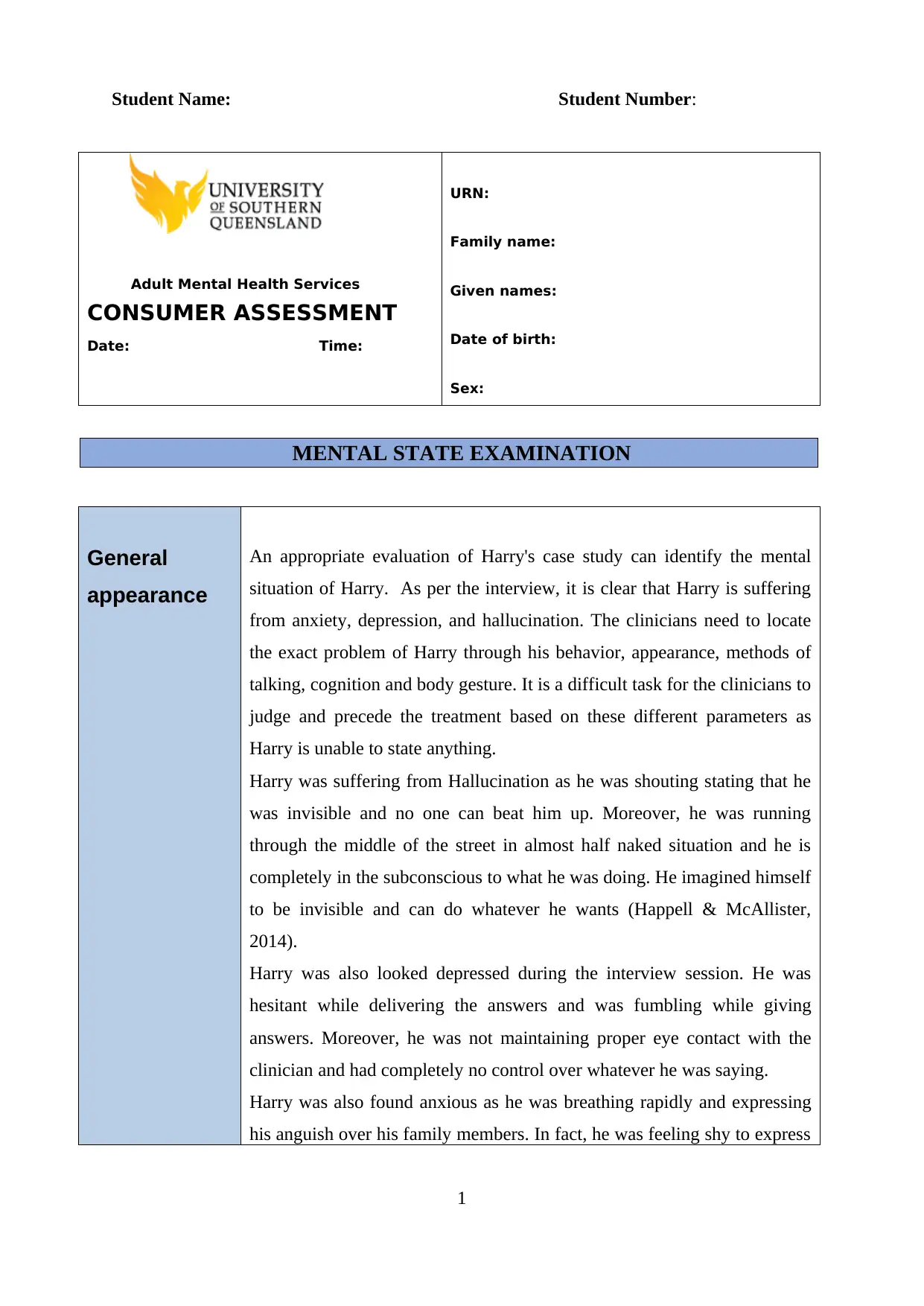
Student Name: Student Number:
Adult Mental Health Services
CONSUMER ASSESSMENT
Date: Time:
URN:
Family name:
Given names:
Date of birth:
Sex:
MENTAL STATE EXAMINATION
General
appearance
An appropriate evaluation of Harry's case study can identify the mental
situation of Harry. As per the interview, it is clear that Harry is suffering
from anxiety, depression, and hallucination. The clinicians need to locate
the exact problem of Harry through his behavior, appearance, methods of
talking, cognition and body gesture. It is a difficult task for the clinicians to
judge and precede the treatment based on these different parameters as
Harry is unable to state anything.
Harry was suffering from Hallucination as he was shouting stating that he
was invisible and no one can beat him up. Moreover, he was running
through the middle of the street in almost half naked situation and he is
completely in the subconscious to what he was doing. He imagined himself
to be invisible and can do whatever he wants (Happell & McAllister,
2014).
Harry was also looked depressed during the interview session. He was
hesitant while delivering the answers and was fumbling while giving
answers. Moreover, he was not maintaining proper eye contact with the
clinician and had completely no control over whatever he was saying.
Harry was also found anxious as he was breathing rapidly and expressing
his anguish over his family members. In fact, he was feeling shy to express
1
Adult Mental Health Services
CONSUMER ASSESSMENT
Date: Time:
URN:
Family name:
Given names:
Date of birth:
Sex:
MENTAL STATE EXAMINATION
General
appearance
An appropriate evaluation of Harry's case study can identify the mental
situation of Harry. As per the interview, it is clear that Harry is suffering
from anxiety, depression, and hallucination. The clinicians need to locate
the exact problem of Harry through his behavior, appearance, methods of
talking, cognition and body gesture. It is a difficult task for the clinicians to
judge and precede the treatment based on these different parameters as
Harry is unable to state anything.
Harry was suffering from Hallucination as he was shouting stating that he
was invisible and no one can beat him up. Moreover, he was running
through the middle of the street in almost half naked situation and he is
completely in the subconscious to what he was doing. He imagined himself
to be invisible and can do whatever he wants (Happell & McAllister,
2014).
Harry was also looked depressed during the interview session. He was
hesitant while delivering the answers and was fumbling while giving
answers. Moreover, he was not maintaining proper eye contact with the
clinician and had completely no control over whatever he was saying.
Harry was also found anxious as he was breathing rapidly and expressing
his anguish over his family members. In fact, he was feeling shy to express
1
Paraphrase This Document
Need a fresh take? Get an instant paraphrase of this document with our AI Paraphraser
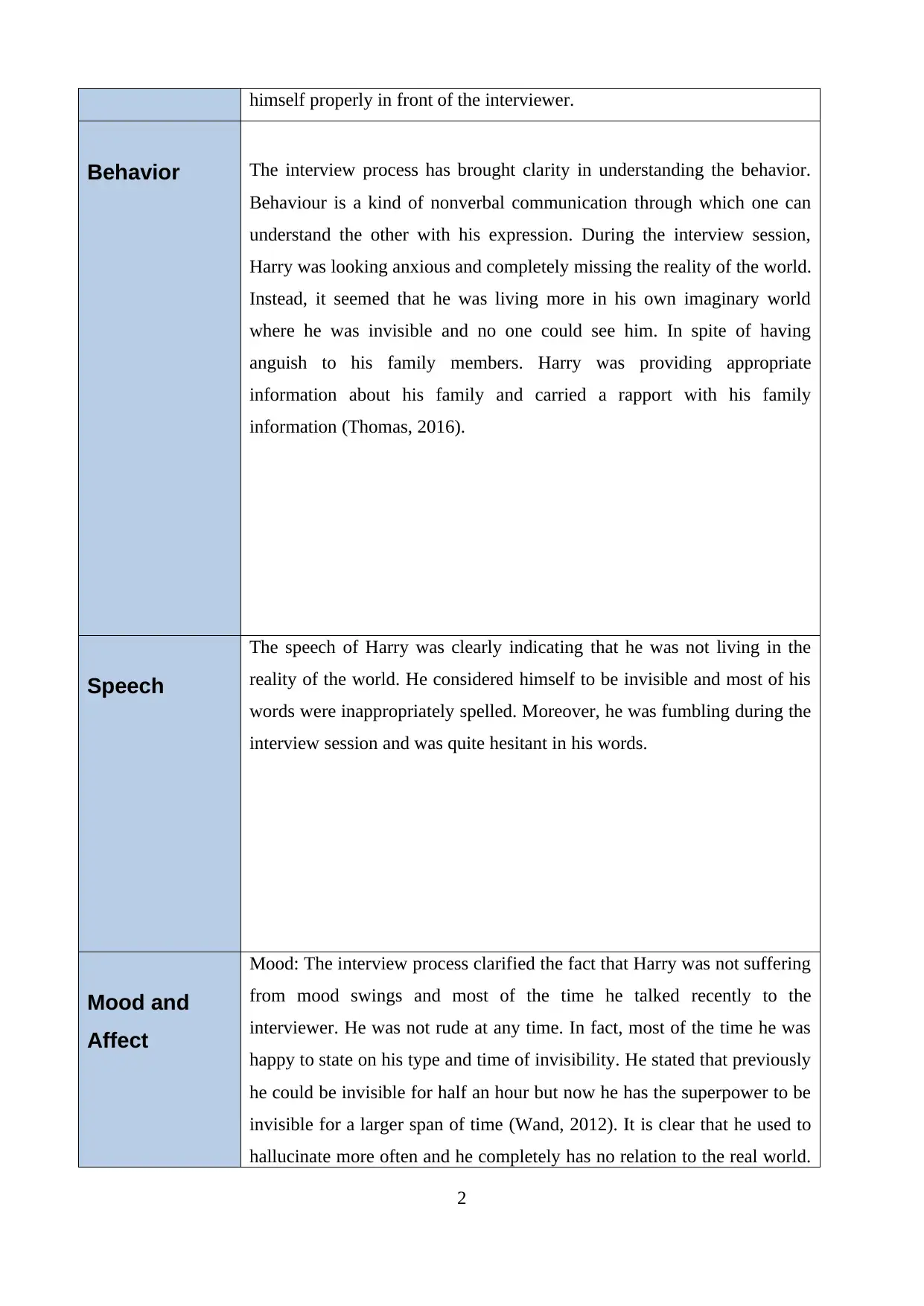
himself properly in front of the interviewer.
Behavior The interview process has brought clarity in understanding the behavior.
Behaviour is a kind of nonverbal communication through which one can
understand the other with his expression. During the interview session,
Harry was looking anxious and completely missing the reality of the world.
Instead, it seemed that he was living more in his own imaginary world
where he was invisible and no one could see him. In spite of having
anguish to his family members. Harry was providing appropriate
information about his family and carried a rapport with his family
information (Thomas, 2016).
Speech
The speech of Harry was clearly indicating that he was not living in the
reality of the world. He considered himself to be invisible and most of his
words were inappropriately spelled. Moreover, he was fumbling during the
interview session and was quite hesitant in his words.
Mood and
Affect
Mood: The interview process clarified the fact that Harry was not suffering
from mood swings and most of the time he talked recently to the
interviewer. He was not rude at any time. In fact, most of the time he was
happy to state on his type and time of invisibility. He stated that previously
he could be invisible for half an hour but now he has the superpower to be
invisible for a larger span of time (Wand, 2012). It is clear that he used to
hallucinate more often and he completely has no relation to the real world.
2
Behavior The interview process has brought clarity in understanding the behavior.
Behaviour is a kind of nonverbal communication through which one can
understand the other with his expression. During the interview session,
Harry was looking anxious and completely missing the reality of the world.
Instead, it seemed that he was living more in his own imaginary world
where he was invisible and no one could see him. In spite of having
anguish to his family members. Harry was providing appropriate
information about his family and carried a rapport with his family
information (Thomas, 2016).
Speech
The speech of Harry was clearly indicating that he was not living in the
reality of the world. He considered himself to be invisible and most of his
words were inappropriately spelled. Moreover, he was fumbling during the
interview session and was quite hesitant in his words.
Mood and
Affect
Mood: The interview process clarified the fact that Harry was not suffering
from mood swings and most of the time he talked recently to the
interviewer. He was not rude at any time. In fact, most of the time he was
happy to state on his type and time of invisibility. He stated that previously
he could be invisible for half an hour but now he has the superpower to be
invisible for a larger span of time (Wand, 2012). It is clear that he used to
hallucinate more often and he completely has no relation to the real world.
2
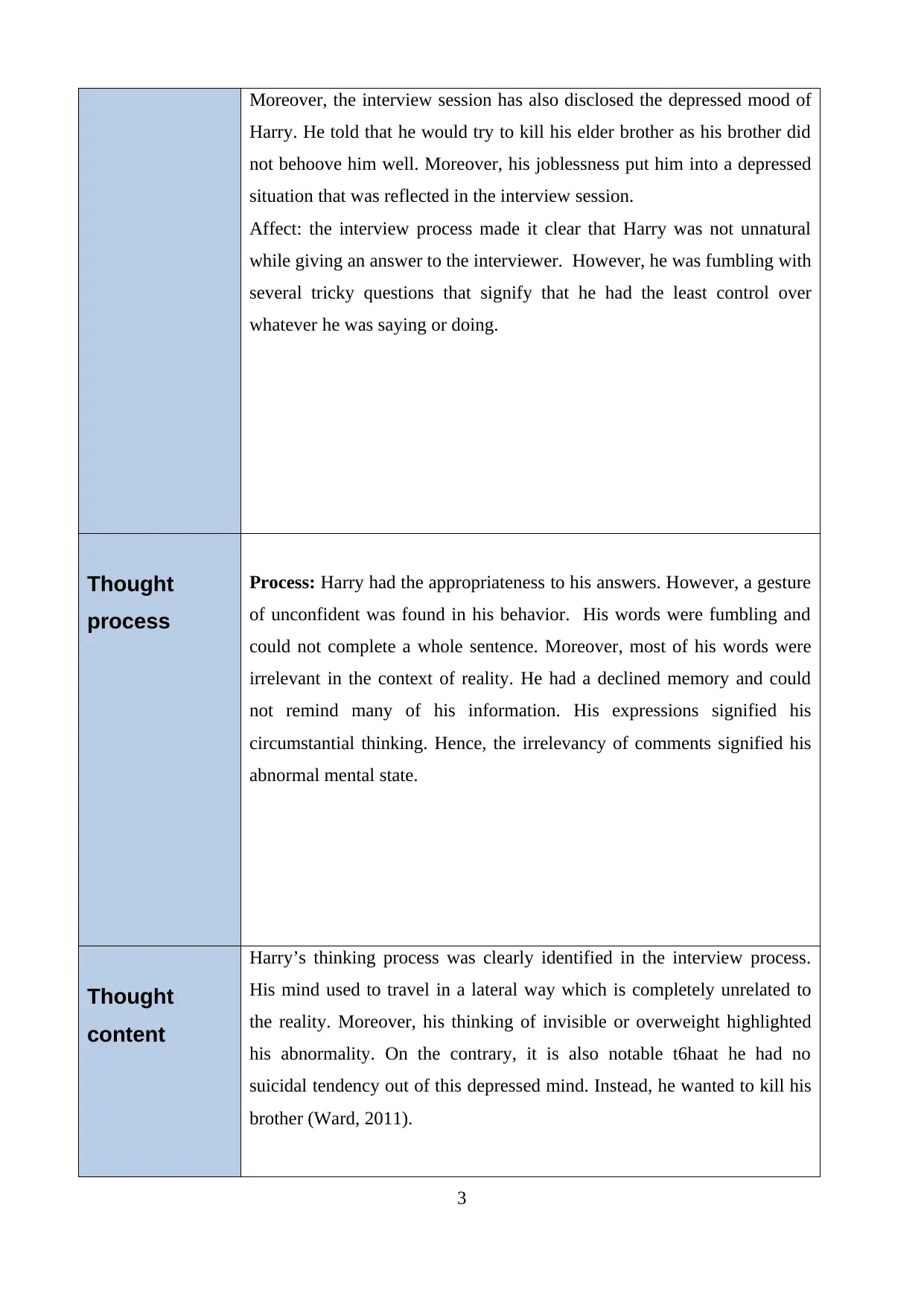
Moreover, the interview session has also disclosed the depressed mood of
Harry. He told that he would try to kill his elder brother as his brother did
not behoove him well. Moreover, his joblessness put him into a depressed
situation that was reflected in the interview session.
Affect: the interview process made it clear that Harry was not unnatural
while giving an answer to the interviewer. However, he was fumbling with
several tricky questions that signify that he had the least control over
whatever he was saying or doing.
Thought
process
Process: Harry had the appropriateness to his answers. However, a gesture
of unconfident was found in his behavior. His words were fumbling and
could not complete a whole sentence. Moreover, most of his words were
irrelevant in the context of reality. He had a declined memory and could
not remind many of his information. His expressions signified his
circumstantial thinking. Hence, the irrelevancy of comments signified his
abnormal mental state.
Thought
content
Harry’s thinking process was clearly identified in the interview process.
His mind used to travel in a lateral way which is completely unrelated to
the reality. Moreover, his thinking of invisible or overweight highlighted
his abnormality. On the contrary, it is also notable t6haat he had no
suicidal tendency out of this depressed mind. Instead, he wanted to kill his
brother (Ward, 2011).
3
Harry. He told that he would try to kill his elder brother as his brother did
not behoove him well. Moreover, his joblessness put him into a depressed
situation that was reflected in the interview session.
Affect: the interview process made it clear that Harry was not unnatural
while giving an answer to the interviewer. However, he was fumbling with
several tricky questions that signify that he had the least control over
whatever he was saying or doing.
Thought
process
Process: Harry had the appropriateness to his answers. However, a gesture
of unconfident was found in his behavior. His words were fumbling and
could not complete a whole sentence. Moreover, most of his words were
irrelevant in the context of reality. He had a declined memory and could
not remind many of his information. His expressions signified his
circumstantial thinking. Hence, the irrelevancy of comments signified his
abnormal mental state.
Thought
content
Harry’s thinking process was clearly identified in the interview process.
His mind used to travel in a lateral way which is completely unrelated to
the reality. Moreover, his thinking of invisible or overweight highlighted
his abnormality. On the contrary, it is also notable t6haat he had no
suicidal tendency out of this depressed mind. Instead, he wanted to kill his
brother (Ward, 2011).
3
⊘ This is a preview!⊘
Do you want full access?
Subscribe today to unlock all pages.

Trusted by 1+ million students worldwide
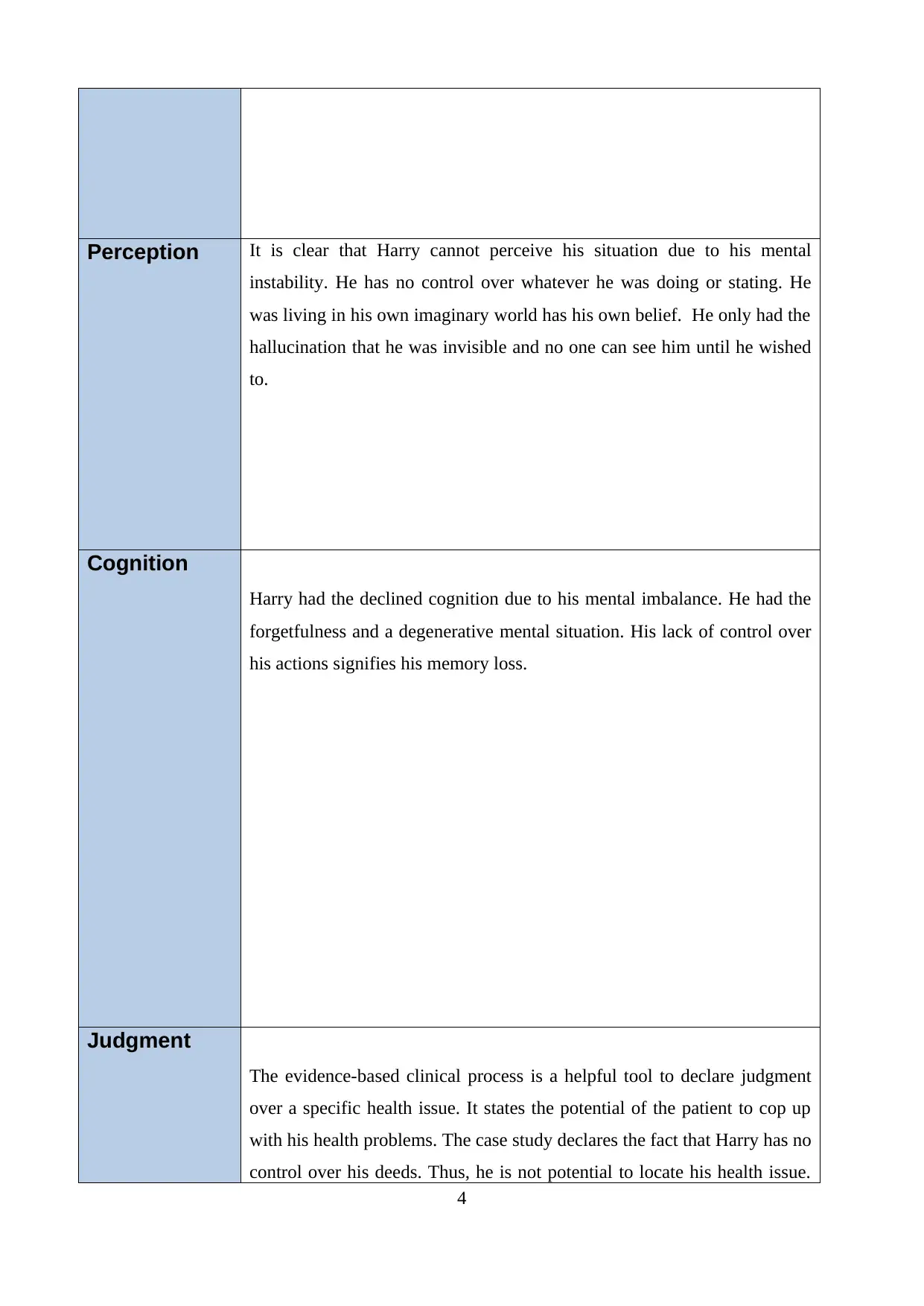
Perception It is clear that Harry cannot perceive his situation due to his mental
instability. He has no control over whatever he was doing or stating. He
was living in his own imaginary world has his own belief. He only had the
hallucination that he was invisible and no one can see him until he wished
to.
Cognition
Harry had the declined cognition due to his mental imbalance. He had the
forgetfulness and a degenerative mental situation. His lack of control over
his actions signifies his memory loss.
Judgment
The evidence-based clinical process is a helpful tool to declare judgment
over a specific health issue. It states the potential of the patient to cop up
with his health problems. The case study declares the fact that Harry has no
control over his deeds. Thus, he is not potential to locate his health issue.
4
instability. He has no control over whatever he was doing or stating. He
was living in his own imaginary world has his own belief. He only had the
hallucination that he was invisible and no one can see him until he wished
to.
Cognition
Harry had the declined cognition due to his mental imbalance. He had the
forgetfulness and a degenerative mental situation. His lack of control over
his actions signifies his memory loss.
Judgment
The evidence-based clinical process is a helpful tool to declare judgment
over a specific health issue. It states the potential of the patient to cop up
with his health problems. The case study declares the fact that Harry has no
control over his deeds. Thus, he is not potential to locate his health issue.
4
Paraphrase This Document
Need a fresh take? Get an instant paraphrase of this document with our AI Paraphraser
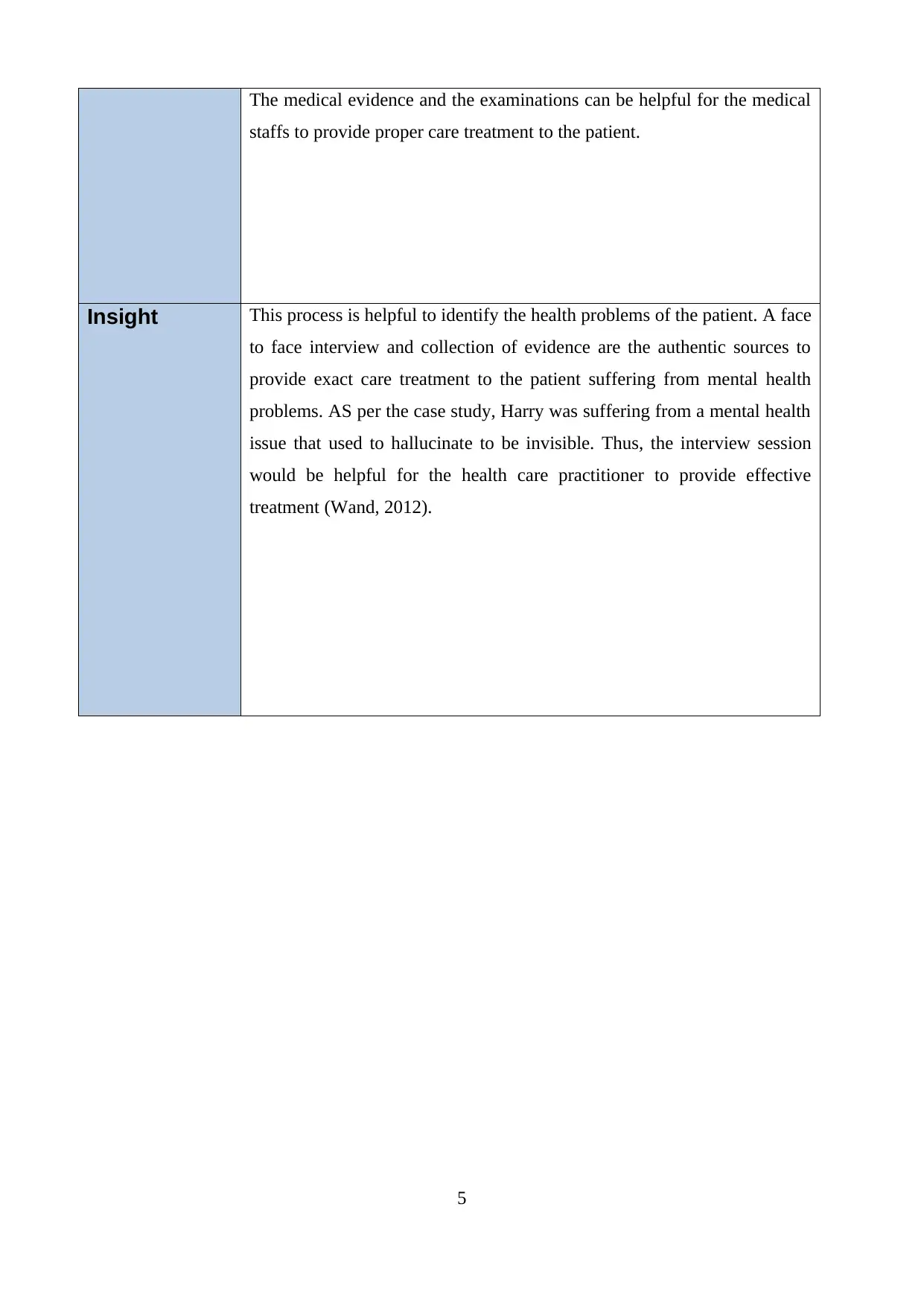
The medical evidence and the examinations can be helpful for the medical
staffs to provide proper care treatment to the patient.
Insight This process is helpful to identify the health problems of the patient. A face
to face interview and collection of evidence are the authentic sources to
provide exact care treatment to the patient suffering from mental health
problems. AS per the case study, Harry was suffering from a mental health
issue that used to hallucinate to be invisible. Thus, the interview session
would be helpful for the health care practitioner to provide effective
treatment (Wand, 2012).
5
staffs to provide proper care treatment to the patient.
Insight This process is helpful to identify the health problems of the patient. A face
to face interview and collection of evidence are the authentic sources to
provide exact care treatment to the patient suffering from mental health
problems. AS per the case study, Harry was suffering from a mental health
issue that used to hallucinate to be invisible. Thus, the interview session
would be helpful for the health care practitioner to provide effective
treatment (Wand, 2012).
5
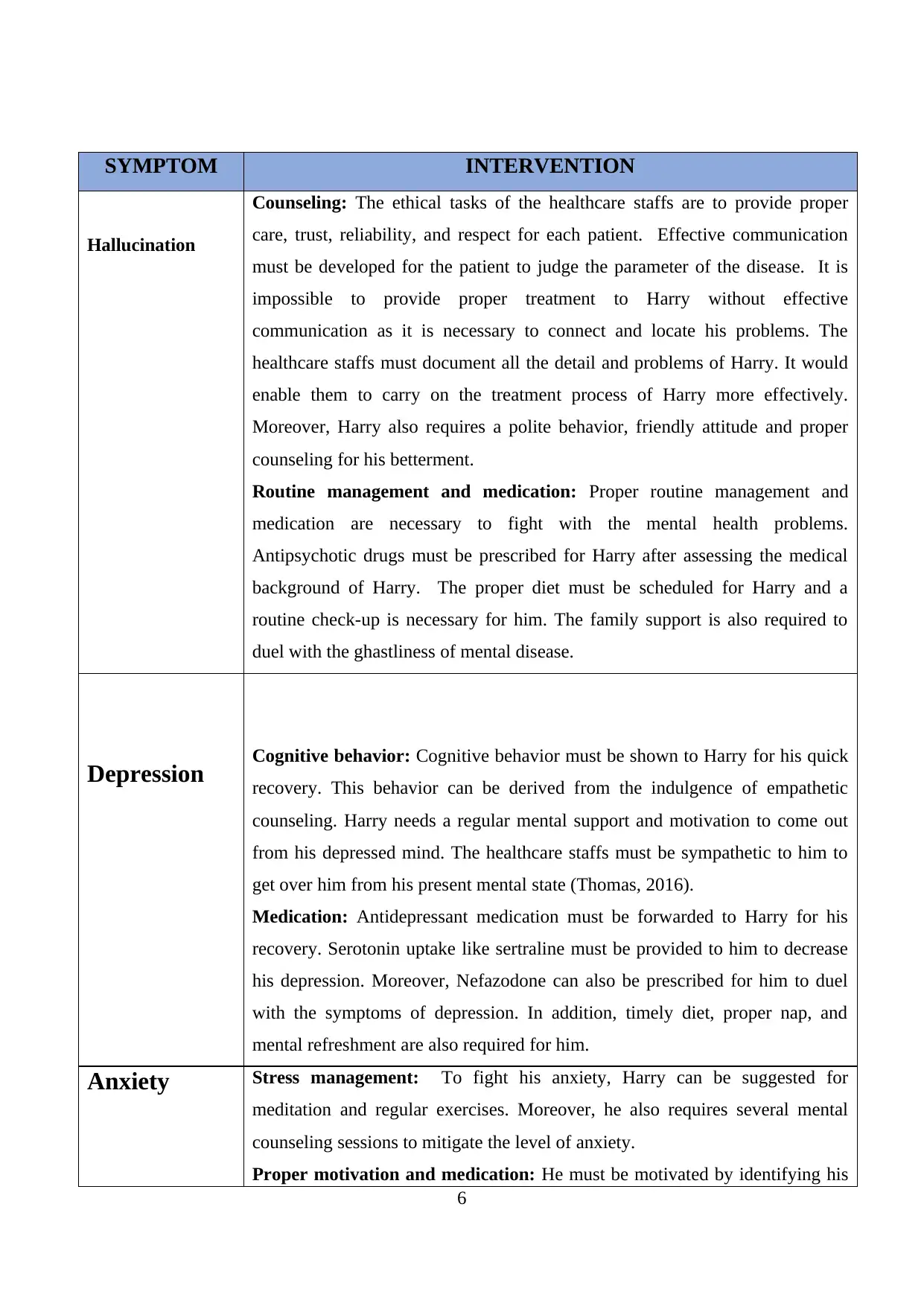
SYMPTOM INTERVENTION
Hallucination
Counseling: The ethical tasks of the healthcare staffs are to provide proper
care, trust, reliability, and respect for each patient. Effective communication
must be developed for the patient to judge the parameter of the disease. It is
impossible to provide proper treatment to Harry without effective
communication as it is necessary to connect and locate his problems. The
healthcare staffs must document all the detail and problems of Harry. It would
enable them to carry on the treatment process of Harry more effectively.
Moreover, Harry also requires a polite behavior, friendly attitude and proper
counseling for his betterment.
Routine management and medication: Proper routine management and
medication are necessary to fight with the mental health problems.
Antipsychotic drugs must be prescribed for Harry after assessing the medical
background of Harry. The proper diet must be scheduled for Harry and a
routine check-up is necessary for him. The family support is also required to
duel with the ghastliness of mental disease.
Depression Cognitive behavior: Cognitive behavior must be shown to Harry for his quick
recovery. This behavior can be derived from the indulgence of empathetic
counseling. Harry needs a regular mental support and motivation to come out
from his depressed mind. The healthcare staffs must be sympathetic to him to
get over him from his present mental state (Thomas, 2016).
Medication: Antidepressant medication must be forwarded to Harry for his
recovery. Serotonin uptake like sertraline must be provided to him to decrease
his depression. Moreover, Nefazodone can also be prescribed for him to duel
with the symptoms of depression. In addition, timely diet, proper nap, and
mental refreshment are also required for him.
Anxiety Stress management: To fight his anxiety, Harry can be suggested for
meditation and regular exercises. Moreover, he also requires several mental
counseling sessions to mitigate the level of anxiety.
Proper motivation and medication: He must be motivated by identifying his
6
Hallucination
Counseling: The ethical tasks of the healthcare staffs are to provide proper
care, trust, reliability, and respect for each patient. Effective communication
must be developed for the patient to judge the parameter of the disease. It is
impossible to provide proper treatment to Harry without effective
communication as it is necessary to connect and locate his problems. The
healthcare staffs must document all the detail and problems of Harry. It would
enable them to carry on the treatment process of Harry more effectively.
Moreover, Harry also requires a polite behavior, friendly attitude and proper
counseling for his betterment.
Routine management and medication: Proper routine management and
medication are necessary to fight with the mental health problems.
Antipsychotic drugs must be prescribed for Harry after assessing the medical
background of Harry. The proper diet must be scheduled for Harry and a
routine check-up is necessary for him. The family support is also required to
duel with the ghastliness of mental disease.
Depression Cognitive behavior: Cognitive behavior must be shown to Harry for his quick
recovery. This behavior can be derived from the indulgence of empathetic
counseling. Harry needs a regular mental support and motivation to come out
from his depressed mind. The healthcare staffs must be sympathetic to him to
get over him from his present mental state (Thomas, 2016).
Medication: Antidepressant medication must be forwarded to Harry for his
recovery. Serotonin uptake like sertraline must be provided to him to decrease
his depression. Moreover, Nefazodone can also be prescribed for him to duel
with the symptoms of depression. In addition, timely diet, proper nap, and
mental refreshment are also required for him.
Anxiety Stress management: To fight his anxiety, Harry can be suggested for
meditation and regular exercises. Moreover, he also requires several mental
counseling sessions to mitigate the level of anxiety.
Proper motivation and medication: He must be motivated by identifying his
6
⊘ This is a preview!⊘
Do you want full access?
Subscribe today to unlock all pages.

Trusted by 1+ million students worldwide
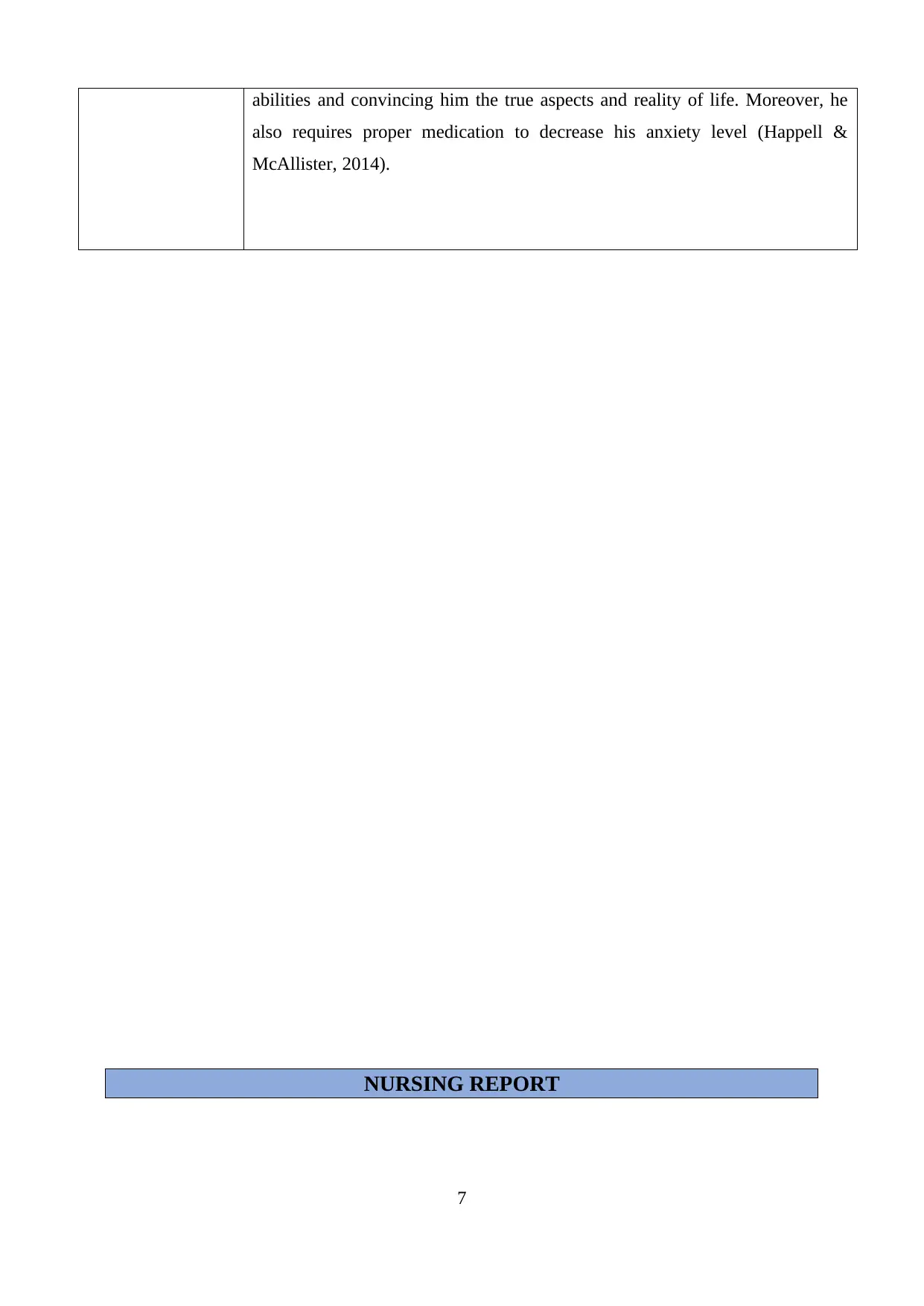
abilities and convincing him the true aspects and reality of life. Moreover, he
also requires proper medication to decrease his anxiety level (Happell &
McAllister, 2014).
NURSING REPORT
7
also requires proper medication to decrease his anxiety level (Happell &
McAllister, 2014).
NURSING REPORT
7
Paraphrase This Document
Need a fresh take? Get an instant paraphrase of this document with our AI Paraphraser
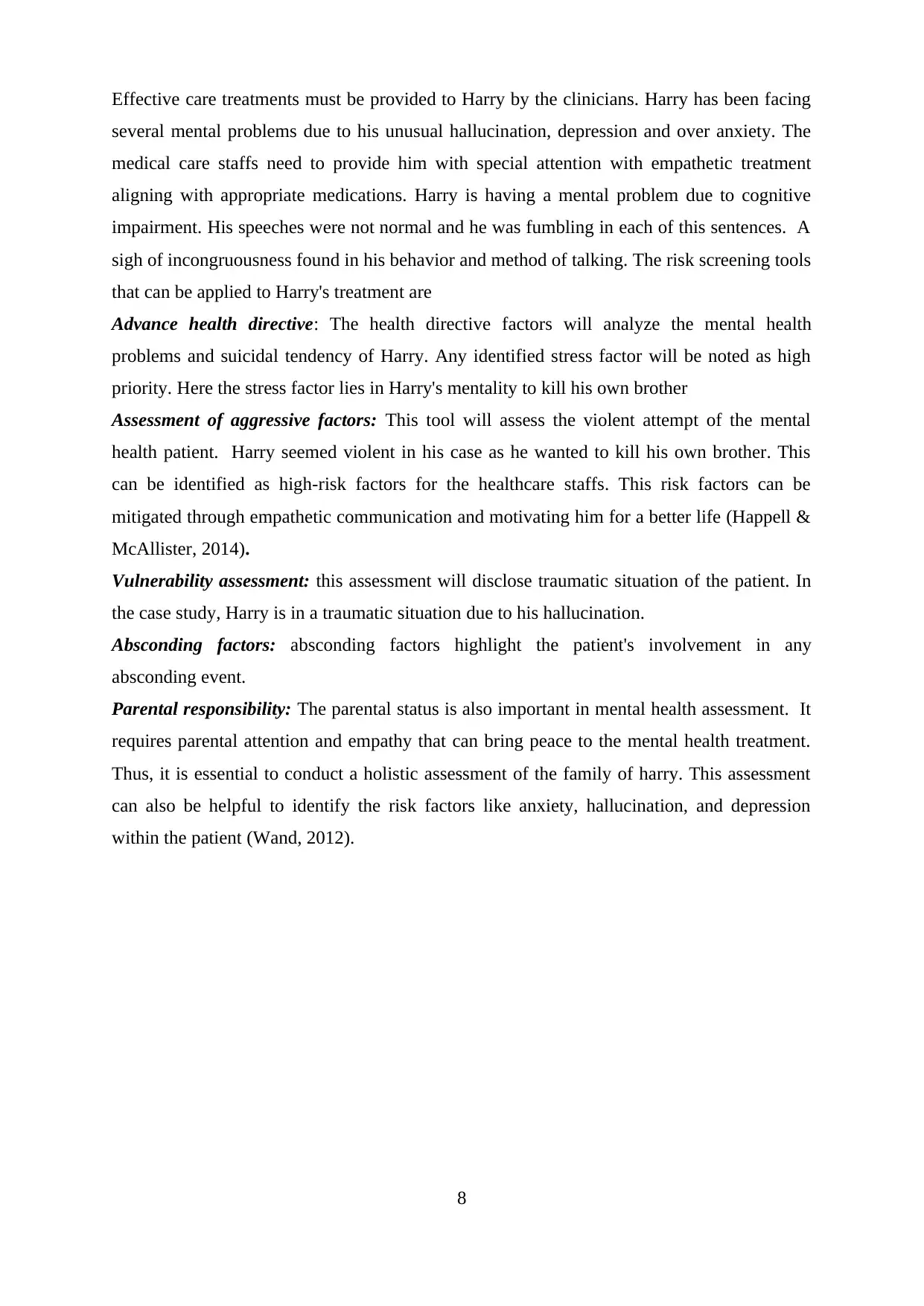
Effective care treatments must be provided to Harry by the clinicians. Harry has been facing
several mental problems due to his unusual hallucination, depression and over anxiety. The
medical care staffs need to provide him with special attention with empathetic treatment
aligning with appropriate medications. Harry is having a mental problem due to cognitive
impairment. His speeches were not normal and he was fumbling in each of this sentences. A
sigh of incongruousness found in his behavior and method of talking. The risk screening tools
that can be applied to Harry's treatment are
Advance health directive: The health directive factors will analyze the mental health
problems and suicidal tendency of Harry. Any identified stress factor will be noted as high
priority. Here the stress factor lies in Harry's mentality to kill his own brother
Assessment of aggressive factors: This tool will assess the violent attempt of the mental
health patient. Harry seemed violent in his case as he wanted to kill his own brother. This
can be identified as high-risk factors for the healthcare staffs. This risk factors can be
mitigated through empathetic communication and motivating him for a better life (Happell &
McAllister, 2014).
Vulnerability assessment: this assessment will disclose traumatic situation of the patient. In
the case study, Harry is in a traumatic situation due to his hallucination.
Absconding factors: absconding factors highlight the patient's involvement in any
absconding event.
Parental responsibility: The parental status is also important in mental health assessment. It
requires parental attention and empathy that can bring peace to the mental health treatment.
Thus, it is essential to conduct a holistic assessment of the family of harry. This assessment
can also be helpful to identify the risk factors like anxiety, hallucination, and depression
within the patient (Wand, 2012).
8
several mental problems due to his unusual hallucination, depression and over anxiety. The
medical care staffs need to provide him with special attention with empathetic treatment
aligning with appropriate medications. Harry is having a mental problem due to cognitive
impairment. His speeches were not normal and he was fumbling in each of this sentences. A
sigh of incongruousness found in his behavior and method of talking. The risk screening tools
that can be applied to Harry's treatment are
Advance health directive: The health directive factors will analyze the mental health
problems and suicidal tendency of Harry. Any identified stress factor will be noted as high
priority. Here the stress factor lies in Harry's mentality to kill his own brother
Assessment of aggressive factors: This tool will assess the violent attempt of the mental
health patient. Harry seemed violent in his case as he wanted to kill his own brother. This
can be identified as high-risk factors for the healthcare staffs. This risk factors can be
mitigated through empathetic communication and motivating him for a better life (Happell &
McAllister, 2014).
Vulnerability assessment: this assessment will disclose traumatic situation of the patient. In
the case study, Harry is in a traumatic situation due to his hallucination.
Absconding factors: absconding factors highlight the patient's involvement in any
absconding event.
Parental responsibility: The parental status is also important in mental health assessment. It
requires parental attention and empathy that can bring peace to the mental health treatment.
Thus, it is essential to conduct a holistic assessment of the family of harry. This assessment
can also be helpful to identify the risk factors like anxiety, hallucination, and depression
within the patient (Wand, 2012).
8
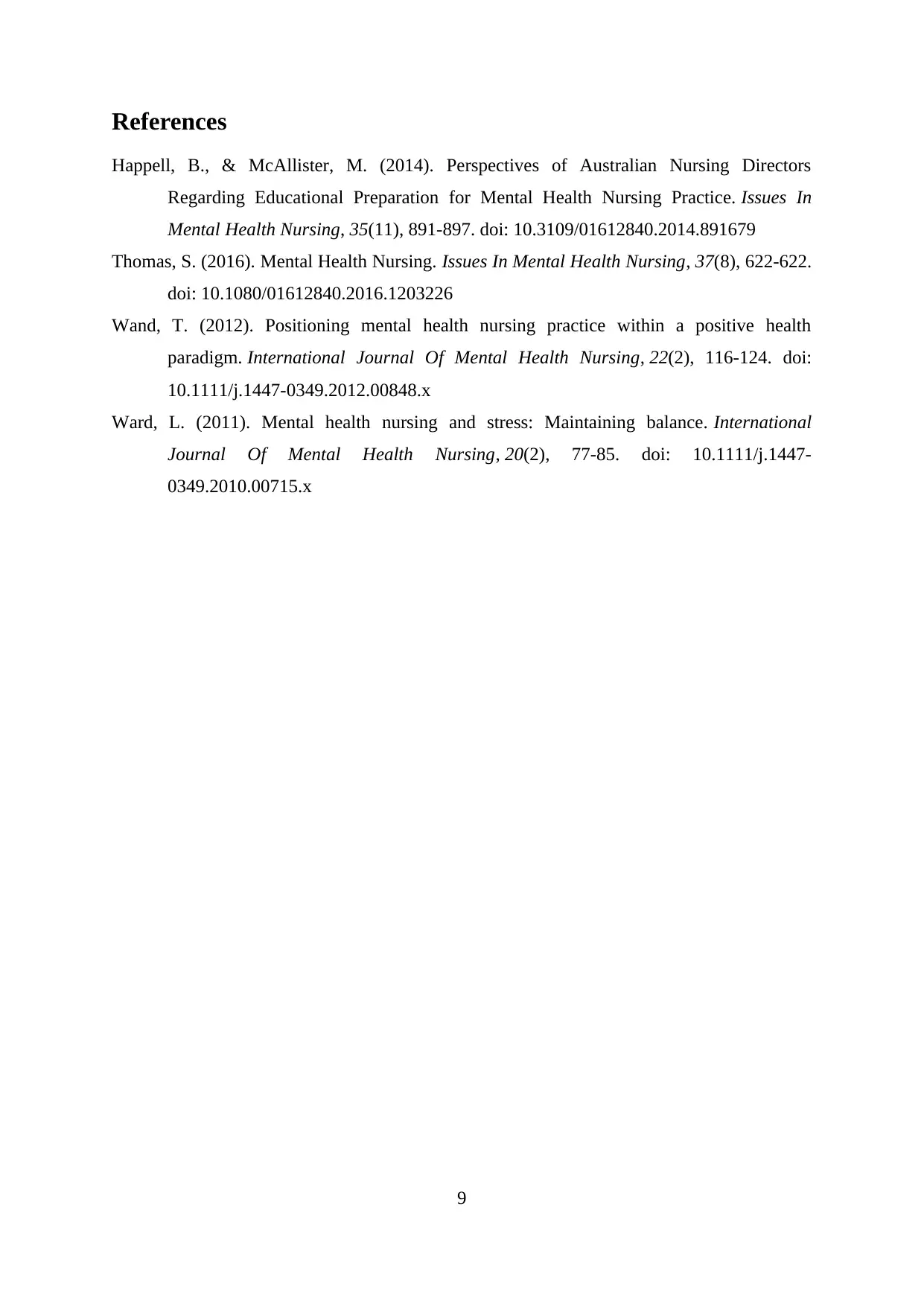
References
Happell, B., & McAllister, M. (2014). Perspectives of Australian Nursing Directors
Regarding Educational Preparation for Mental Health Nursing Practice. Issues In
Mental Health Nursing, 35(11), 891-897. doi: 10.3109/01612840.2014.891679
Thomas, S. (2016). Mental Health Nursing. Issues In Mental Health Nursing, 37(8), 622-622.
doi: 10.1080/01612840.2016.1203226
Wand, T. (2012). Positioning mental health nursing practice within a positive health
paradigm. International Journal Of Mental Health Nursing, 22(2), 116-124. doi:
10.1111/j.1447-0349.2012.00848.x
Ward, L. (2011). Mental health nursing and stress: Maintaining balance. International
Journal Of Mental Health Nursing, 20(2), 77-85. doi: 10.1111/j.1447-
0349.2010.00715.x
9
Happell, B., & McAllister, M. (2014). Perspectives of Australian Nursing Directors
Regarding Educational Preparation for Mental Health Nursing Practice. Issues In
Mental Health Nursing, 35(11), 891-897. doi: 10.3109/01612840.2014.891679
Thomas, S. (2016). Mental Health Nursing. Issues In Mental Health Nursing, 37(8), 622-622.
doi: 10.1080/01612840.2016.1203226
Wand, T. (2012). Positioning mental health nursing practice within a positive health
paradigm. International Journal Of Mental Health Nursing, 22(2), 116-124. doi:
10.1111/j.1447-0349.2012.00848.x
Ward, L. (2011). Mental health nursing and stress: Maintaining balance. International
Journal Of Mental Health Nursing, 20(2), 77-85. doi: 10.1111/j.1447-
0349.2010.00715.x
9
⊘ This is a preview!⊘
Do you want full access?
Subscribe today to unlock all pages.

Trusted by 1+ million students worldwide
1 out of 9
Related Documents
Your All-in-One AI-Powered Toolkit for Academic Success.
+13062052269
info@desklib.com
Available 24*7 on WhatsApp / Email
![[object Object]](/_next/static/media/star-bottom.7253800d.svg)
Unlock your academic potential
Copyright © 2020–2026 A2Z Services. All Rights Reserved. Developed and managed by ZUCOL.





